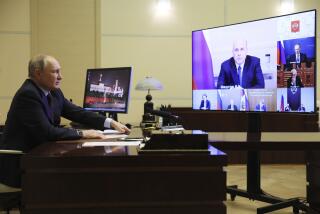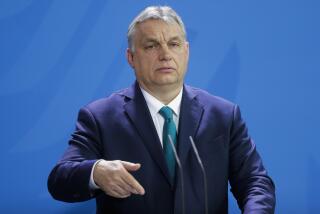Clinton Seeks Delay in Vote on Test-Ban Treaty Ahead of Sure Defeat
- Share via
OTTAWA — In a rare concession of defeat on a sensitive diplomatic issue, President Clinton asked the U.S. Senate on Friday to postpone a vote on a global treaty banning nuclear tests and promised he would not use the issue against Republicans in the 2000 election.
“I have asked them to put it off because we don’t have the votes,” Clinton said, referring to next week’s scheduled floor vote on the Comprehensive Test Ban Treaty.
As Senate Democrats launched new efforts to hold off the vote, Clinton essentially gave in to Republicans’ two major conditions for deferring action: He publicly asked for a delay and indicated that he would not object to holding off until after the 2000 election.
“If they take more than a year to deal with this . . . that’s OK with me,” Clinton said during a news conference in this Canadian capital, where he opened a new U.S. Embassy. He said it would be best to take the test-ban issue “out of politics” for now.
Clinton’s statement represents a public acknowledgment of failure on one of his administration’s top foreign policy priorities and reflects further deterioration of the tradition of bipartisanship on national security matters.
Proponents of the accord argue that Senate rejection essentially would doom the treaty by encouraging U.S. allies and Third World countries to resume testing and development of nuclear weapons. Critics charge that nuclear tests cannot be monitored accurately and that “rogue” states would not sign in any case.
Most of the major nuclear powers, including the United States, Russia and China, claim to have suspended nuclear testing. Although more than 150 nations have signed the treaty, it must be ratified by all 44 countries that conduct nuclear research or have nuclear reactors. So far, only 23 have done so.
The president’s remarks drew qualified approval from some Republicans. Sen. John W. Warner (R-Va.) pronounced Clinton’s statement a move in the right direction. “The president each day is taking a step in realization of what has to be done,” Warner said.
But John Czwartacki, spokesman for Senate Majority Leader Trent Lott (R-Miss.), indicated that Republicans probably would insist that Clinton put both concessions in writing before they move to pull the treaty off the floor in advance of the vote.
He also warned that any efforts by Democrats to try to block a vote through parliamentary maneuvering would be “viewed [by Republicans] as a direct assault on majority control.” He said a challenge of that sort, while legal, would be “unthinkable” under Senate tradition.
Czwartacki was referring to a strategy outlined by Senate Minority Leader Tom Daschle (D-S.D.), who intends to use an arcane parliamentary procedure to try to block the vote.
Although Friday’s developments do not break the impasse over whether to delay the vote, as the Democrats now want, they appear to lay the groundwork for a possible deal. Debate on the treaty, which is still scheduled for a vote Tuesday or Wednesday, began Friday.
Throughout his news conference, Clinton repeatedly decried what he characterized as a political invasion of a traditionally nonpolitical realm of government.
He warned of the potential consequences of failing to ratify. “If we don’t have the treaty, the United States will continue to refrain from testing, and we’ll give a green light to every other country in the world to test, to develop, to modernize nuclear weapons,” Clinton said.
The Senate, he said, had approached the treaty “like a political document,” drumming up opposition before the matter had been given a hearing.
*
Gerstenzang reported from Ottawa and Pine from Washington.
More to Read
Get the L.A. Times Politics newsletter
Deeply reported insights into legislation, politics and policy from Sacramento, Washington and beyond. In your inbox twice per week.
You may occasionally receive promotional content from the Los Angeles Times.









